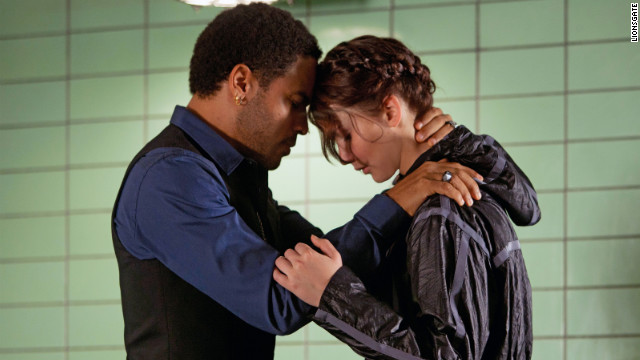
- Some "Hunger Games" fans are displeased that Cinna, Thresh and Rue are played by black actors
- Both Thresh and Rue are described as having "dark skin" in Suzanne Collins' novel
- Casting director: Usually, fans are angry when a film adaptation strays from the novel
(CNN) -- In "The Hunger Games," wealthy Capitol citizens of all races and ethnicities come together to watch the 74th annual bloodbath of the same name. It seems some present-day moviegoers, however, are a bit less "post-racial."
Earlier this week, some "Hunger Games" fans tweeted their discontent because the characters of Cinna, Thresh and Rue are played by black actors in the big screen adaptation. This, despite the fact that both Thresh (Dayo Okeniyi) and Rue (Amandla Stenberg) are described as having "dark skin" in Suzanne Collins' novel, while Cinna (Lenny Kravitz) is simply described as having short brown hair.
Whether fans' remarks -- such as, "Awkward moment when Rue is some black girl and not the little innocent blonde girl you picture" -- stem from poor reading comprehension or intolerance, they're indicative of a larger issue in Hollywood, said Harry M. Benshoff, an associate professor of radio, TV and film at the University of North Texas who co-wrote "America on Film: Representing Race, Class, Gender and Sexuality at the Movies."
"Hollywood has never been on the forefront of the civil rights movement," said Benshoff, who hasn't read or watched "The Hunger Games."
Despite certain character descriptions being spelled out in the book, Benshoff said, people typically project themselves onto a character in order to empathize with that person.
"For a white person reading a book, they're very rarely going to go, 'I'm just assuming this is a black character' if he or she isn't marked as such," he said. "A nonwhite person might project their own identity onto the character."
Skin color is a recurring but understated motif of the novels. Many Capitol residents, for instance, dye their skin to make a statement of affluence, taking on exotic hues like green, gold and olive.
The way Hollywood sees it, the more people who identify with a character, the more tickets a movie might sell, he added, referencing Donald Glover's May 2010 Twitter campaign for the chance to audition for Spider-Man. (The role eventually went to British actor Andrew Garfield).
"Put Donald Glover as Spider-Man, (and the movie) will only make $80 million rather than $100 million," Benshoff said. "If it's Tobey Maguire or Andrew Garfield, it's a Spider-Man movie. With Donald Glover, it's a black superhero movie."
In June 2010, African-American blogs lit up when Angelina Jolie's name was proposed for the lead role in the upcoming "Cleopatra: A Life." The book's author agreed that the actress would be a good fit in the role as the Egyptian queen.
An Essence.com post stated: "Honestly, I don't care how full Angelina Jolie's lips are, how many African children she adopts, or how bronzed her skin will become for the film, I firmly believe this role should have gone to a Black woman."
And there are plenty more instances of white actors snagging minority roles: Fans were disappointed when Jake Gyllenhaal was cast as the Prince of Persia, and the lack of Asian actors cast in M. Night Shyamalan's "The Last Airbender" prompted some people to boycott the film.
Usually fans are angry when a film adaptation strays too far from a novel, said casting director David Rubin. In "The Hunger Games" "They're being true to the source material, so I don't see what the issue is," he said.
Having cast film adaptations of popular books like "The Firm" and "The English Patient," Rubin added, "It's impossible to be slavish to the way characters are described in a novel because those characters exist in the readers' mind in a purely subjective way. ... It's often ... a self-referential image."
Rubin recently worked on HBO's "Game Change," in which Julianne Moore and Ed Harris play Sarah Palin and John McCain, respectively. He said casting historical and political figures, who are known to the audience, is different from putting a face to a character from a novel.
"[Moore and Harris' performances] are not impersonations, and certainly not caricatures," Rubin said. "They are evocative of those people and they have their own integrity. But they're close enough to make people feel like they're watching the real thing."
Even so, Moore said she underwent quite the physical transformation to play Palin, spending two hours in makeup before shooting. Similarly, Jennifer Lawrence and Josh Hutcherson both changed their hair color for "The Hunger Games."
"As a casting director," Rubin said, "I'm concerned about the quality of performance much more than hair color, and if an audience leaves a film overly concerned about the color of a character's hair, something might be missing from the storytelling."
As far as the backlash over casting black actors in "The Hunger Games," he said "I like to think Hollywood studios would take the high road on this issue, and remain true to the story regardless of what a segment of the population might object."
No comments:
Post a Comment